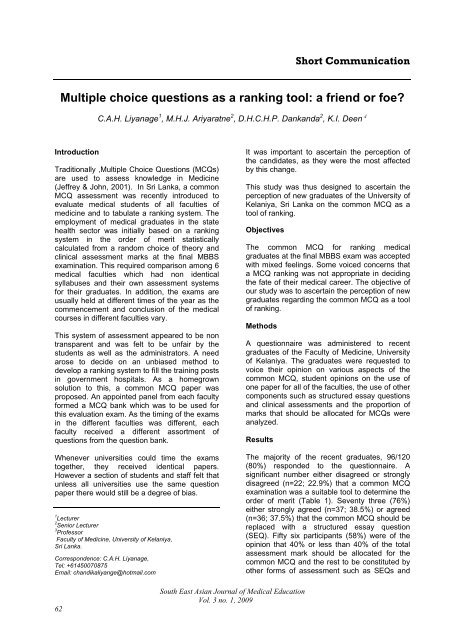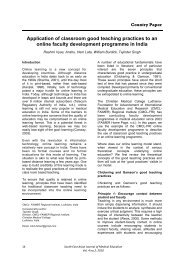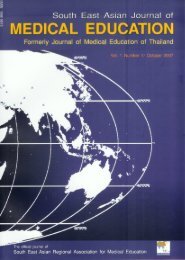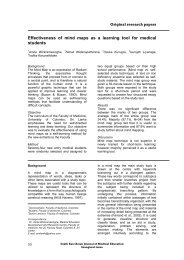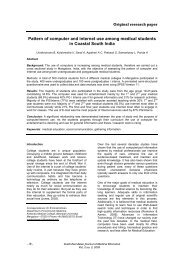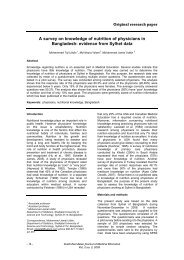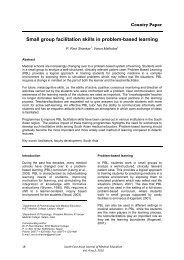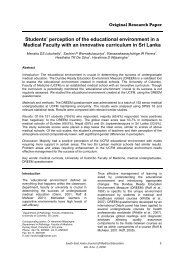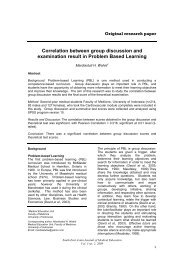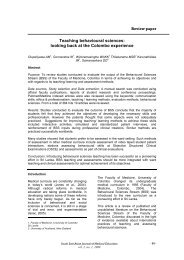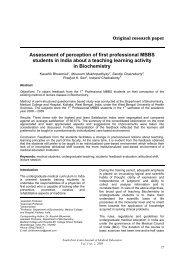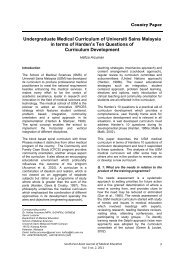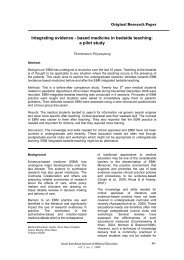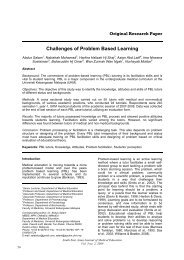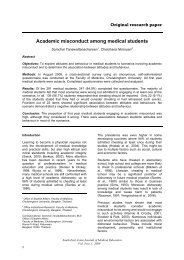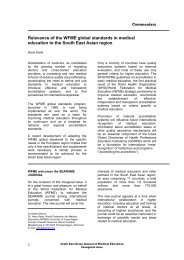Multiple choice questions as a ranking tool: a friend or foe?
Multiple choice questions as a ranking tool: a friend or foe?
Multiple choice questions as a ranking tool: a friend or foe?
You also want an ePaper? Increase the reach of your titles
YUMPU automatically turns print PDFs into web optimized ePapers that Google loves.
Sh<strong>or</strong>t Communication<br />
<strong>Multiple</strong> <strong>choice</strong> <strong>questions</strong> <strong>as</strong> a <strong>ranking</strong> <strong>tool</strong>: a <strong>friend</strong> <strong>or</strong> <strong>foe</strong>?<br />
C.A.H. Liyanage 1 , M.H.J. Ariyaratne 2 , D.H.C.H.P. Dankanda 2 , K.I. Deen 4<br />
Introduction<br />
Traditionally ,<strong>Multiple</strong> Choice Questions (MCQs)<br />
are used to <strong>as</strong>sess knowledge in Medicine<br />
(Jeffrey & John, 2001). In Sri Lanka, a common<br />
MCQ <strong>as</strong>sessment w<strong>as</strong> recently introduced to<br />
evaluate medical students of all faculties of<br />
medicine and to tabulate a <strong>ranking</strong> system. The<br />
employment of medical graduates in the state<br />
health sect<strong>or</strong> w<strong>as</strong> initially b<strong>as</strong>ed on a <strong>ranking</strong><br />
system in the <strong>or</strong>der of merit statistically<br />
calculated from a random <strong>choice</strong> of the<strong>or</strong>y and<br />
clinical <strong>as</strong>sessment marks at the final MBBS<br />
examination. This required comparison among 6<br />
medical faculties which had non identical<br />
syllabuses and their own <strong>as</strong>sessment systems<br />
f<strong>or</strong> their graduates. In addition, the exams are<br />
usually held at different times of the year <strong>as</strong> the<br />
commencement and conclusion of the medical<br />
courses in different faculties vary.<br />
This system of <strong>as</strong>sessment appeared to be non<br />
transparent and w<strong>as</strong> felt to be unfair by the<br />
students <strong>as</strong> well <strong>as</strong> the administrat<strong>or</strong>s. A need<br />
arose to decide on an unbi<strong>as</strong>ed method to<br />
develop a <strong>ranking</strong> system to fill the training posts<br />
in government hospitals. As a homegrown<br />
solution to this, a common MCQ paper w<strong>as</strong><br />
proposed. An appointed panel from each faculty<br />
f<strong>or</strong>med a MCQ bank which w<strong>as</strong> to be used f<strong>or</strong><br />
this evaluation exam. As the timing of the exams<br />
in the different faculties w<strong>as</strong> different, each<br />
faculty received a different <strong>as</strong>s<strong>or</strong>tment of<br />
<strong>questions</strong> from the question bank.<br />
Whenever universities could time the exams<br />
together, they received identical papers.<br />
However a section of students and staff felt that<br />
unless all universities use the same question<br />
paper there would still be a degree of bi<strong>as</strong>.<br />
1<br />
Lecturer<br />
2<br />
Seni<strong>or</strong> Lecturer<br />
3<br />
Profess<strong>or</strong><br />
Faculty of Medicine, University of Kelaniya,<br />
Sri Lanka.<br />
C<strong>or</strong>respondence: C.A.H. Liyanage,<br />
Tel: +61450070875<br />
Email: chandikaliyange@hotmail.com<br />
It w<strong>as</strong> imp<strong>or</strong>tant to <strong>as</strong>certain the perception of<br />
the candidates, <strong>as</strong> they were the most affected<br />
by this change.<br />
This study w<strong>as</strong> thus designed to <strong>as</strong>certain the<br />
perception of new graduates of the University of<br />
Kelaniya, Sri Lanka on the common MCQ <strong>as</strong> a<br />
<strong>tool</strong> of <strong>ranking</strong>.<br />
Objectives<br />
The common MCQ f<strong>or</strong> <strong>ranking</strong> medical<br />
graduates at the final MBBS exam w<strong>as</strong> accepted<br />
with mixed feelings. Some voiced concerns that<br />
a MCQ <strong>ranking</strong> w<strong>as</strong> not appropriate in deciding<br />
the fate of their medical career. The objective of<br />
our study w<strong>as</strong> to <strong>as</strong>certain the perception of new<br />
graduates regarding the common MCQ <strong>as</strong> a <strong>tool</strong><br />
of <strong>ranking</strong>.<br />
Methods<br />
A questionnaire w<strong>as</strong> administered to recent<br />
graduates of the Faculty of Medicine, University<br />
of Kelaniya. The graduates were requested to<br />
voice their opinion on various <strong>as</strong>pects of the<br />
common MCQ, student opinions on the use of<br />
one paper f<strong>or</strong> all of the faculties, the use of other<br />
components such <strong>as</strong> structured essay <strong>questions</strong><br />
and clinical <strong>as</strong>sessments and the prop<strong>or</strong>tion of<br />
marks that should be allocated f<strong>or</strong> MCQs were<br />
analyzed.<br />
Results<br />
The maj<strong>or</strong>ity of the recent graduates, 96/120<br />
(80%) responded to the questionnaire. A<br />
significant number either disagreed <strong>or</strong> strongly<br />
disagreed (n=22; 22.9%) that a common MCQ<br />
examination w<strong>as</strong> a suitable <strong>tool</strong> to determine the<br />
<strong>or</strong>der of merit (Table 1). Seventy three (76%)<br />
either strongly agreed (n=37; 38.5%) <strong>or</strong> agreed<br />
(n=36; 37.5%) that the common MCQ should be<br />
replaced with a structured essay question<br />
(SEQ). Fifty six participants (58%) were of the<br />
opinion that 40% <strong>or</strong> less than 40% of the total<br />
<strong>as</strong>sessment mark should be allocated f<strong>or</strong> the<br />
common MCQ and the rest to be constituted by<br />
other f<strong>or</strong>ms of <strong>as</strong>sessment such <strong>as</strong> SEQs and<br />
62<br />
South E<strong>as</strong>t Asian Journal of Medical Education<br />
Vol. 3 no. 1, 2009
clinical components. Twenty one graduates<br />
(22%) thought that MCQs should carry 50% of<br />
the total <strong>as</strong>sessment marks. The maj<strong>or</strong>ity either<br />
strongly agreed (n=76; 79%) <strong>or</strong> agreed (n=12;<br />
12.5%) that all faculties should receive the<br />
same question paper. They remarked this w<strong>as</strong><br />
the only rational way to alleviate bi<strong>as</strong> from such<br />
a process of <strong>as</strong>sessment. Over one half were<br />
of the opinion that a common MCQ alone w<strong>as</strong><br />
not a fair <strong>as</strong>sess<strong>or</strong>, chiefly because of non<br />
unif<strong>or</strong>mity of the “common MCQ” paper.<br />
Discussion<br />
MCQs have been used extensively in all kinds of<br />
examinations. It is a time tested method of<br />
<strong>as</strong>sessment of knowledge in both undergraduate<br />
and postgraduate medical education (Jeffrey &<br />
John, 2001; Schuwirth et al., 1996).<br />
Tabulating a common <strong>ranking</strong> <strong>or</strong>der of merit of<br />
the newly qualified doct<strong>or</strong>s h<strong>as</strong> been a<br />
controversial issue f<strong>or</strong> a significant period of<br />
time. The current practice is to use the marks of<br />
MCQs at the final MBBS exam to f<strong>or</strong>mulate the<br />
<strong>or</strong>der of merit. The opinions of the medical<br />
students differ regarding the way they are being<br />
tested.<br />
It is interesting to note that a significant<br />
prop<strong>or</strong>tion of participants felt that this w<strong>as</strong> not<br />
the best f<strong>or</strong>m of <strong>as</strong>sessment. They believed that<br />
other types of f<strong>or</strong>mal testing would result in a<br />
better chance to display their knowledge. In<br />
supp<strong>or</strong>t of this argument it is understood that<br />
acc<strong>or</strong>ding to the <strong>as</strong>sessment matrix MCQs test<br />
only recall and problem solving and hardly test<br />
the clinical attributes (Table 2).<br />
MCQs sometimes have inherent flaws such <strong>as</strong><br />
frequent lack of content validity, cueing effect of<br />
the options and encouragement of guessing.<br />
The low taxonomy level of the items would also<br />
have serious implications in examinations of<br />
clinical competence. However, it w<strong>as</strong> argued<br />
that it is the best way to objectively test a<br />
student (Newble & Elmslie, 1979; Bloom, 1956;<br />
Premad<strong>as</strong>a, 1993). This is mainly because there<br />
is no examiner bi<strong>as</strong> in the <strong>as</strong>sessment. Although<br />
students wish f<strong>or</strong> inc<strong>or</strong>p<strong>or</strong>ation of other methods<br />
like SEQs and clinical <strong>as</strong>sessment, these<br />
methods may be flawed by examiner and<br />
institutional bi<strong>as</strong> (Abdel-Hameed et al., 2005).<br />
A common MCQ paper f<strong>or</strong> all the faculties would<br />
be the best bench mark where no student could<br />
complain of discrimination. However, there will<br />
be many obstacles in bringing all universities<br />
under one fold of <strong>as</strong>sessment,<br />
It is w<strong>or</strong>thwhile to <strong>as</strong>certain if the students on<br />
their part would agree to wait if required, so that<br />
all can sit f<strong>or</strong> an identical exam <strong>or</strong> whether all<br />
would want to beat the other to finish the MBBS<br />
race.<br />
Table 1: Perception of new graduates on the role of MCQ <strong>as</strong> a <strong>ranking</strong> <strong>tool</strong><br />
n %<br />
MCQ <strong>as</strong> a suitable <strong>tool</strong> 74 71%<br />
MCQ , SEQ and Clinical 56 58%<br />
Unif<strong>or</strong>m MCQ f<strong>or</strong> all the faculties 76 79%<br />
Table 2: Assessment matrix f<strong>or</strong> <strong>as</strong>sessment of clinical streams<br />
Attribute<br />
Assessment technique<br />
<strong>Multiple</strong> <strong>choice</strong><br />
<strong>questions</strong><br />
Essay Objective structured<br />
clinical exam<br />
Long<br />
c<strong>as</strong>e<br />
Recall of facts +++ + + +<br />
Problem solving + ++ +<br />
Communication<br />
++ ++<br />
skills<br />
Manual skills +<br />
Ethics +<br />
South E<strong>as</strong>t Asian Journal of Medical Education<br />
Vol. 3 no. 1, 2009<br />
63
Conclusion<br />
It is now “agreed” that a common MCQ paper is<br />
the “best way” of objectively testing a medical<br />
student f<strong>or</strong> the purpose of <strong>ranking</strong> in the <strong>or</strong>der of<br />
merit in the current Sri Lankan context. While<br />
respecting the opinion of these graduates on<br />
their views on this crucial matter, it appears fair<br />
that their plea f<strong>or</strong> all medical schools to be<br />
tested by a single exam be considered by an<br />
independent auth<strong>or</strong>ity.<br />
References<br />
Abdel-Hameed, A.A., Al-Faris, E.A. & Al<strong>or</strong>ainy, I.A.<br />
(2005) The criteria and analysis of good multiple<br />
<strong>choice</strong> <strong>questions</strong> in a health professional setting,<br />
Saudi Medical Journal, 26, pp.1505-1510.<br />
Bloom, B.S. (1956) Taxonomy of Educational<br />
Objectives, Handbook I: Cognitive Domain, (London,<br />
Longman).<br />
Jeffrey, H. & John, C.H. (2001) The development of<br />
undergraduate curricula in surgery: III. Assessment,<br />
ANZ Journal of Surgery, 71, pp. 178-183.<br />
Newble, D.I. & Elmslie, G. (1979) A comparison of<br />
multiple <strong>choice</strong> tests and free response tests in<br />
examinations of clinical competence, Medical<br />
Education, 13, pp. 263-268.<br />
Premad<strong>as</strong>a I.G. (1993) A reappraisal of the use of<br />
multiple <strong>choice</strong> <strong>questions</strong>, Medical Teacher, 15, pp.<br />
237-242.<br />
Schuwirth, L.W.T., Stoffers, H.E.J.H. & Peperkamp,<br />
A.G.W. (1996) Computerized long- menu <strong>questions</strong><br />
<strong>as</strong> an alternative to open ended <strong>questions</strong> in<br />
computerized <strong>as</strong>sessment, Medical Education, 30,<br />
pp. 50-55.<br />
64<br />
South E<strong>as</strong>t Asian Journal of Medical Education<br />
Vol. 3 no. 1, 2009


